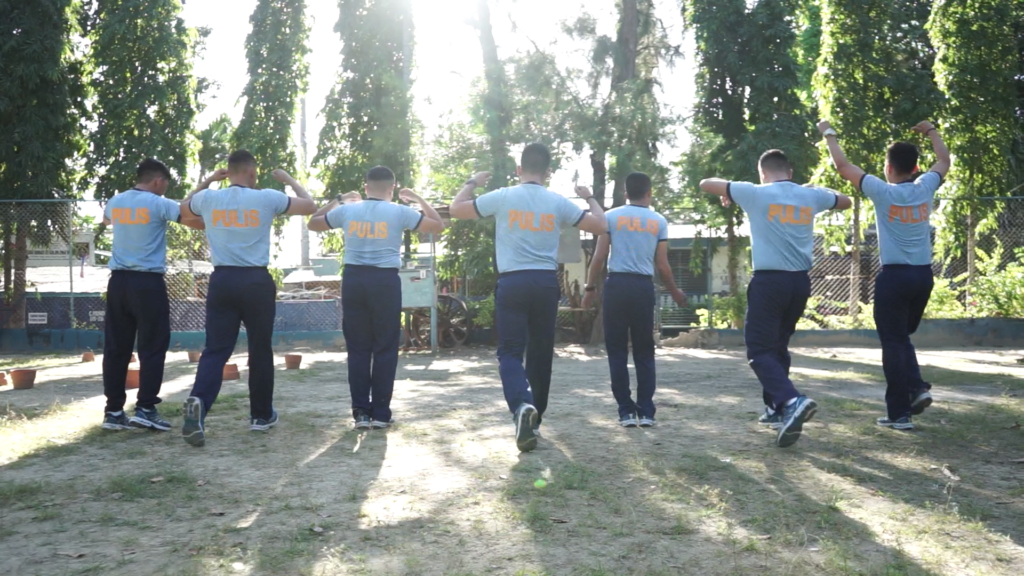The dancing police of Central Visayas

Dancing policemen perform a dance routine during one of their practices. | Raul Constantine Tabanao
CEBU CITY, Philippines — Have you heard about the dancers of the Police Regional Office in Central Visayas (PRO-7)?
If not, then you have just missed one of the most unexpected things there is.
No, they are not hired civilians who are paid to dance regularly to entertain guests during events.
The PRO-7 dancers are full-fledged policemen who have been going around Central Visayas and performing in front of crowds during police-initiated activities.
Yes, policemen can dance too! And this police dance group is proof to that.
If the fear of the community towards the police has slowly crumbled, making way for a cooperative public, it could be traced to one of the factors that made it possible — the performances of these police dancers, which the community saw online and even witnessed up close during police-community programs.
Who are the PRO-7 dancers?

PRO-7’s dancing cops consist of officers who are assigned in the different police stations in Cebu City. | Raul Constantine Tabanao
For Patrolman Christian Dabuco, currently assigned to the City Mobile force Company (CMFC) of the Cebu City Police Office (CCPO), the job was a dream come true after he joined the PRO-7 dancers.
Dabuco, who has been a dancer since his younger days, was more than excited when there were plans of forming a police dance group.
On his second year of service, the then regional director of PRO-7, Police Major General Debold Sinas, wanted to form a dance group that would be the official entertainer during events and activities led by the police.
Dabuco and 16 other patrolmen- and patrolwomen-ranked police, who were interested, volunteered.
Eventually, the dance group was formed and their performances were no longer limited to the PRO-7 headquarters, as they were brought to medical missions, provincial post visitations and other police engagements outside Cebu.

The dancing cops of the Police Regional Office in Central Visayas show that joining the service can be fun too. | Raul Constantine Tabanao
A goal to entertain
Patrolman Kirk Kilat, now assigned in the PRO-7 post, could not forget that day in December 2018 where they performed in front of a large crowd at the Fuente Osmeña Circle.
Kilat said he could not forget that day, not because there was a large crowd, but because he saw from his vantage point on the stage the smiles, confused and surprised look of the crowd when the PRO-7 dancers started to dance in their athletic uniform.
“Happy mi nga ang mga audience lahi nga kapulisan ilahang nakita sa stage,” said Kilat.
(We were happy that the audience saw on stage another side of the police.)
Kilat said it had been that way for most of their performances in other places: People seemed to be in awe and delighted by seeing police officers dance.
According to Kiat, this was the other purpose why the group was created — to let the community know that the police are more than just conducting operations and arresting outlaws.
The dancer’s responsibility
But the glory days of the PRO-7 dancers were put to stop after Sinas was transferred to become the regional director of the National Capital Region Police Office (NCRPO) in October 2019.
The PRO-7 dancers were recalled back to other units.
Some, like Kilat, were recalled to the original province that they were assigned to.
They were back to performing their regular duties for almost four months, during the assumption of Police Brigadier General Valeriano De Leon.
But after De Leon was assigned back to the Philippine National Police (PNP) headquarters this February and was replaced by Police Brigadier General Albert Ignatius Ferro, the PRO-7 dancers were packing their bags again as they were called to reassemble.
Now, Kilat and Dabuco are back to balancing their schedule between duty and practice.
Challenges
After four months of performing regular police tasks, some dancers admitted that they were having a difficult time adjusting back to keeping up with both their duties and practices.
As there are more lineup of police-community activities, the PRO-7 dance group has to come up with dance routines and performances that would be appropriate or suited to a specified activity.
Moreover, the dance group often have to perform several dances, which also meant that they have to prepare more than the required time for practice.
Dabuco said that it was part of the challenge they faced as they had to find time to be consistent with their practices without compromising their duties and responsibilities as police officers.
That was why it was important for the members of the group to balance their time well and to make sure that they had time for everything.
Dabuco said that if there was one requirement needed for a policeman, who would want to join the group, it would be his or her willingness to be flexible and to manage his or her time well.
He said becoming a member of the PRO-7 dance group was a great opportunity as one would be able to express his or her own talent.
But, he said, there would also be more responsibility given to each member as they would be first public servants with specific tasks that would be expected to be well taken care of./elb
Disclaimer: The comments uploaded on this site do not necessarily represent or reflect the views of management and owner of Cebudailynews. We reserve the right to exclude comments that we deem to be inconsistent with our editorial standards.
